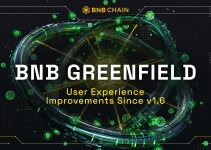
This blog is contributed from the community
LaborX, a global recruitment platform that connects individuals directly with work opportunities, has announced its integration with Binance Smart Chain.
LaborX is designed to help freelancers gain access to employment opportunities in the gig economy, cutting out the middleman in the job-hunting process by using smart contracts to organise tasks and pay users automatically in cryptocurrency.
The platform’s target audience includes:
- Individuals who are willing to receive payment for their services in cryptocurrencies and stablecoins.
- Employers who recognize the benefits of tapping into a global market of skilled freelancers.
LaborX takes the integration of blockchain and its benefits to a new level, decentralizing all of the most important processes and ensuring that freelancers and customers can interact without unnecessary interference, gatekeepers, platform fees, or single points of failure. By formalizing work agreements with smart contracts, LaborX enables the creation of a truly free and global market for labour.
Benefits of LaborX
LaborX’s deep integration of blockchain offers a number of features and benefits:
- Payment in cryptocurrency allows fast, borderless settlement for tasks upon completion. Cryptocurrencies supported on Binance Smart Chain include BNB, BUSD, BTC, USDT and DAI.
- Reliability and fairness are ensured by digital work agreements: smart contract-powered arrangements between freelancers and employers which formalise the workflow and key milestones, as well as fixing the process for remuneration and acting as escrow for confidence and security.
- Low platform fees compared to traditional freelance exchanges. While most competitors charge commission fees between 5% and 20%, LaborX’s fees are between 0 and 5%.
- Reputation system that scores freelancers based on transactions in the blockchain, completed work, feedback, and multiple other factors.
- Dispute Resolution. In the event of a disagreement between freelancer and customer about the work completed, third-party arbitration may be requested.
Jobs and Gigs: Two Types of Digital Work Agreement
There are at least two popular models for interaction between freelancers and customers in the industry.
- The employer publishes a Job, receives applications from freelancers, and selects the one they want to complete the work. This is the approach that Upwork and many other services adopt.
- The freelancer advertises one or more services (Gigs) they are able to complete, with clear scope and a fixed price. Employers can search, select and order the service and freelancer they want. This approach was popularized by Fiverr.
LaborX has implemented both methods for connecting freelancers and customers. An employer can either publish a task they want completed, or find a service and freelancer from a database of gigs. Similarly, freelancers can either search for a job in the advertised listings, or post a gig and wait for responses.
While all the logic for organizing and paying for work is managed on the blockchain, content data is stored in a centralized repository. This combines the convenience and speed of using centralized storage with the security and reliability of a smart contracts-based system.
Initially, a highly flexible smart contract was developed. This features:
- Support for multiple tasks
- Prepayment and escrow
- Payment mechanism, either per-task at agreed milestones, or at the end of the project
- Review and approval by both parties before a job begins
- Termination conditions
While this includes many settings and allows a wide range of jobs to be organized, it also has certain drawbacks:
- The number of steps and conditions introduces complexity that presents difficulties for many users
- The contract incurs several separate transaction fees
- Freelancers often do not have the funds (ETH) to sign a contract, especially if they have just started using LaborX and are new to crypto
To address these issues, the LaborX team developed a new Gigs module, featuring a streamlined smart contract that makes organising work fast, low-cost and straightforward. Customers simply order a Gig from the database of services posted by freelancers. The smart contracts are simpler, and therefore cost less, and fewer transactions are required to organise a job. Crucially, freelancers are not required to sign the Gig agreement up-front.
Binance Smart Chain Integration
While the new Gig contracts are far simpler and cheaper to execute, they have not completely solved the problem of Ethereum’s high transaction fees for LaborX users.
Employers still typically have to spend around $7-12 to sign a contract. Given that the average payment for the work itself is generally in the range of $10-30, this adds an additional 50% to the cost of arranging work. In many cases, this is a deal-breaker.
The decision was consequently made to integrate Binance Smart Chain into LaborX. There are a number of advantages to this approach:
- Transaction costs drop to just a few cents – over a hundred times cheaper.
- Transaction processing speeds increase by five times.
- Binance Smart Chain is compatible with the Ethereum Virtual Machine (EVM), which hugely simplifies the integration process. Implementation took less than a week.
- Users can send and accept several new currencies and tokens as payment.
LaborX is built on the ideals of freedom of choice and competition, which the team believes are among the fundamental values of blockchain. The platform will now offer both Ethereum and Binance Smart Chain in parallel, giving users the choice of which network they want to operate on – though at the moment, the case for Binance over Ethereum for this use case is clear. The LaborX team also plans to integrate Tron in the near future.
Future Plans and Promotion
The LaborX team is continuing to build out its infrastructure and functionality, with a series of new features planned for the near future:
- Integration of additional popular EVM-compatible blockchains
- Implementing new ways to sign transactions (MetaMask, WalletConnect, Portis, etc)
- Ability to sign contracts for full-time roles
- Addition of HR module
- Automatic selection of a full, bespoke team for more complex projects, based on AI algorithms
- Further improvement and optimisation of the current functionality for both Jobs and Gigs
Alongside these improvements, LaborX will be conducting an active campaign to attract new users, including:
- Search Engine Optimization (SEO)
- Adverts on popular social networks
- Promotion within specific social network groups (including dedicated reddit, Telegram and Facebook communities), advertising regular gig opportunities
- Referral campaigns, for freelancers who have advertised their services and are interested in attracting more employers
- Affiliate programme with remuneration from 50% to 80% of LaborX’s commission fees


